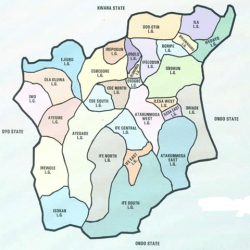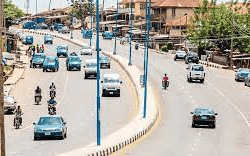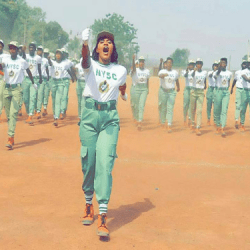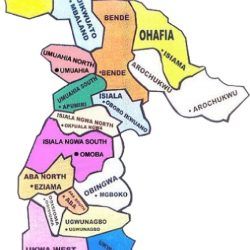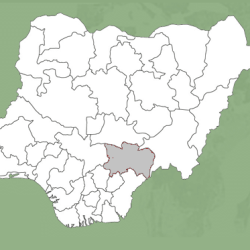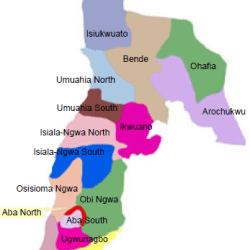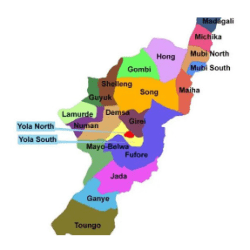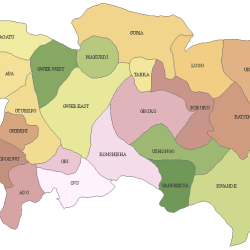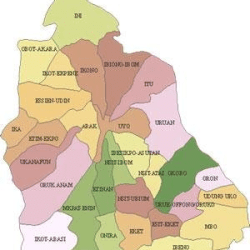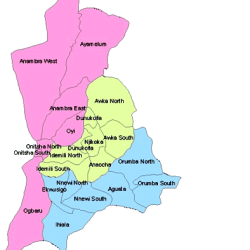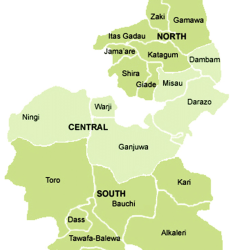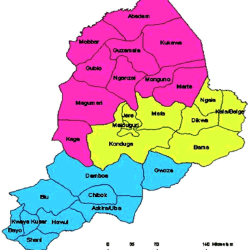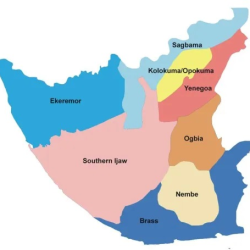Local Government Areas in Osun state and the addresses of their headquarters
| SN | LGA | Headquarters address |
| 1 | Ayedaade | Ayedaade Local Govt Gbongan |
| 2 | Ayedire | 1 Col Ogunkanmi Road Ile Ogbo |
| 3 | Atakunmosa East | Atakunmosa Local Government, Iperindo |
| 4 | Atakunmosa West | Atakunmosa West Local Government Osu |
| 5 | Boripe | P.M.B 2001, Oke Osun Area Iragbiji |
| 6 | Boluwaduro | P.M.B 1001 Otan Ayegbaju |
| 7 | Ede North | Ede North Local Govt Ede |
| 8 | Ede South | P.M.B 213, Oke Iresi Ede |
| 9 | Egbedore | Egbedore Local Government, Awo |
| 10 | Ejigbo | 117 Oba Akinjole Way, Ejigbo |
| 11 | Ifedayo | P.M.B 208, Oke Ila |
| 12 | Ifelodun | Ifelodun Local Government, Ikirun |
| 13 | Ife Central | Ife Central Local Govt Ajebandele, Ile Ife |
| 14 | Ife East | Ife East Local Government, Oke Ogbo |
| 15 | Ife North | P.M.B 504 Akinola Road Ipetumodu |
| 16 | Ife South | P.O Box 10 Ifetedo |
| 17 | Ila | Ila Local Government, Ila Orangun |
| 18 | Ilesa East | P.M.B 5003 Iyemogun Road, Ilesa |
| 19 | Ilesa West | Omialadiye, Osogbo Road Ilesa |
| 20 | Irepodun | Irepodun Local Government, Ilobu |
| 21 | Irewole | P.M.B 5002, Ibadan-Ile Ife Expressway, Ikire. |
| 22 | Isokan | P.M.B Orile Owu Road, Yidi Area, Apomu |
| 23 | Iwo | Iwo Local Govt, Iwo |
| 24 | Obokun | P.O Box 174. Osogbo Road, Ibokun |
| 25 | Odo Otin | Odo Otin LG Headquarters, Okuku |
| 26 | Ola Oluwa | P.M.B 287 Bode Osi |
| 27 | Olorunda | P.M.B 4324 Igbona, Osogbo |
| 28 | Oriade | Oba Oladele Olashore Way Ijebu Jesa |
| 29 | Orolu | P.M.B 111 Ogbomosho Federal Road Ifon |
| 30 | Osogbo | P.M.B 4318, Ibokun Road, Oke Baale, Osogbo |
Osun State
Osun is a state in Nigeria. It is inhabited mostly by the Yorubas.
The Yoruba ethnic group live in large numbers in Oyo, Ogun, Ondo and Lagos states but Osun is culturally their central state.
- State Capital: Osogbo
- Statehood Day: August 27 , 1991
- Population: 3,423,535( 1996 National Census)
- Area Size: 14,875 (square kilometres)
- Median household Income: $50,614 (11th)
- Occupation: Agrarian (256,000 Farming Families)
- Area Cultivated:149,478 Hectares
- Nickname: State of the Virtuous (Ipinle Omoluabi)
- Hotspots: Osun Osogbo Groove, Erin Ijesha Waterfall, Ile-Ife
- Religion: Christianity, Islam and Traditional
The name ‘’Osun’’ comes from a river that flows through the state. It is symbolic because it serves both spiritual and tourist purposes in the state. The river is worshipped annually by devotees. It is also a tourist spot as people from different parts of the country visit the Osun Groove in Osogbo. The river also provides water for irrigation for the agriculturally rich state.

Yoruba tradition has it that Ile-Ife in the State of Osun is where Olodumare started the creation of the world. It represents the beginning of life, the birthplace of civilization, the embodiment of all that we see or feel.

Vision is the pathway and the guiding light into the future. This was what the founding fathers and agitators for the creation of a state to be named ‘’ Osun ‘’ had in mind and did everything possible to realise the vision. They weathered opposition and confronted obstacles for the generation past, present and unborn.
The struggle for the creation of Osun started as early as 1950.

At that time, the present senatorial districts namely Osun West, Central and part of Osun East were subordinate towns under the administration of Ibadan District Native Authority but in there determination to get independence, traditional rulers and citizens of Osun Area submitted a petition to the British Colonial Administration in Nigeria demanding autonomy for Osun Division, with Osogbo proposed as the headquarters

To realise their aim, they pursued this agenda further in 1951, when a Commission Of Inquiry was set up the Colonialists, headed by H.L Butcher primarily saddled with investigating the crisis in Ibadan District Native Authority between Chief Salami Agbaje and Olubadan-in-Council. At this commission, named H.L Butcher Commission of Inquiry, a representation was made by people of Osun Area reiterating their resolve for autonomy. This demand was granted on March 17th 1951, thus recommending autonomy for Osun District Towns on April 1st 1951.
The resilience and doggedness of the founding fathers and crusaders for the creation of Osun was rewarded on August 27th 1991, when the administration of Gen Ibrahim Badamosi Babangida created nine states with Osun created out of Oyo State with Osogbo as the capital. It was a dream fulfilled and hope achieved.
Osun emboldens the history of a people whose quest for freedom, self-actualisation, determination and hope for a better tomorrow fought and won the battle for its creation. It was a dream fulfilled and hope achieved.
Osun has a fairly large population. According to the 2006 National Population Census, the population of the state is put at 3,423,535. The state is rich in human and material resources
Historical evidence shows that the Yoruba tradition is one of the earliest and dominant traditions in Nigeria. The people of Osun are predominantly Yoruba. The state is composed of Osun, Ifes, Ijesas and Igbominas. Their language is Yoruba but there are variations in intonation and accent in across the towns and cities.

Commercial activities have brought the people of the state in contact with non-indigenes and foreigners who have adopted the state as their homes owing to the peaceful nature of the people and prevalent atmosphere.
Osun is culturally rich and this can be seen in all spheres of life such as arts, literature, music and other social activities in the state. Similarly, the state is blessed with a highly literate and articulate populace which makes up a strong and productive workforce
Being an agrarian state, agriculture is largely practised both at commercial and subsistence scales and this attracts people from outside the state.
Traditional Institutions

Oba Adeyeye Enitan Ogunwusi. The Oni of Ile-Ife
The traditional institution such as Kingship which dates back to pre-colonial era is still held in high reverence in the state. Their foresight, determination and aggressiveness led to the creation of Osun .Obas as they are called play pivotal roles in ensuring peace and stability in their domain as well as preserving the age-long tradition and culture
The State is blessed with qualitative traditional rulers, highly educated and sound in their various field of endeavour thus using it for the overall development of their people and domain. They are highly enlightened, widely travelled and committed to the progress of the state in general.
Foremost traditional rulers in the state includes the Ooni of Ife, The Ataoja of Osogbo, The Owa Obokun of Ijesa Land, The Timi of Ede, Oluwo of Iwo, Akinrun of Ikirun, and a host of other traditional rulers.
Socio-Economic and Cultural Background
The social environment in the state is characterised by a people filled with warmth, hospitable, tolerant and accommodating. The social relationship existent in Osun is a plus to the economic aspect because businesses and economy grows in an atmosphere of peace. This affords indigenes and foreigners the opportunity to carry out their commercial activities in a conducive environment devoid of violence and arson.
Being an agrarian state, the presence of food and cash crops pools traders and artisans to the state and this further helps in the economic development .The state is famous for many prominent markets such as Owena, Sekona, Ikirun, Ifon, Odo Ori markets and a whole lot of others
The presence of cottage industries provides jobs for the virile manpower abundant in the state. The railway track crossing in the state also helps in the economic development through movement of goods and people.
The state has produced cultural icons like Chief Duro Ladipo, Twin Seven Seven, Nike Art Gallery and the famous Susan Wenger popularly known as Adunni Olorisa. The state is famous for festivals such as Osun Osogbo International Festival, Olojo Festival in Ife, Iwude Festival in Ilesa. Osun is also blessed with numerous tourist attractions like the Kiriji War Museum, Erin Ijesa Waterfalls, Oranmiyan staff at Ife Ife Museum, Obafemi Awolowo University Zoological Gardens, Ayinkunigba water falls, Mbari-Mbayo Cultural Heritage, Idi Baba Cultural Centre, Igbo Sango at Ede. These tourists’ sites are potential sources of revenue generation.
Religious Environment
Osun is a multi religious environment with inhabitants practicing Christianity and other religions.
The diverse nature of their faiths and the peaceful nature characterise the way everyone goes about it harmoniously is a lesson in tolerance. The state has never witnessed a religious crisis whether minor or major since its creation.

Pastor E.A. Adeboye
It is also worthy of note that notable religious leaders have their roots in the state and this includes; Pastor E.A Adeboye of The Redeemed Christian Church of God, Prophet S.K Abiara of Christ Apostolic Church, Chief Priest Yemi Elebuibon, Pastor Mathew Ashimolowo of Kingsway International Christian Center and various legendary faith based organisations who have brought pride to the state.
Educationally Enriched
The thirst for western education has always being a thing of pride in the state making the literacy level to be on the high side.

Obafemi Awolowo University, Ile-Ife
The presence of educational institutions in the state is a major advantage and is being run by both public and private sectors.
The state boasts of Technical Schools, Schools of Health Technology, Schools of Nursing and Midwifery, two public polytechnics and three privately owned, two public universities and five private ones.
